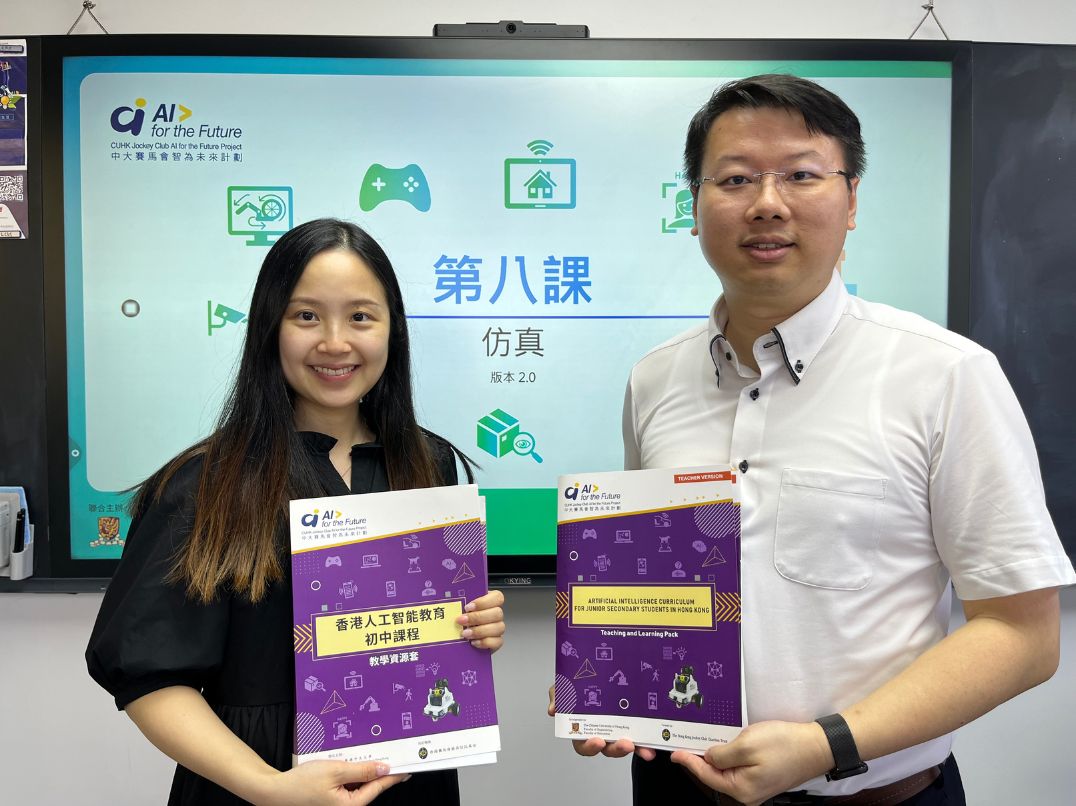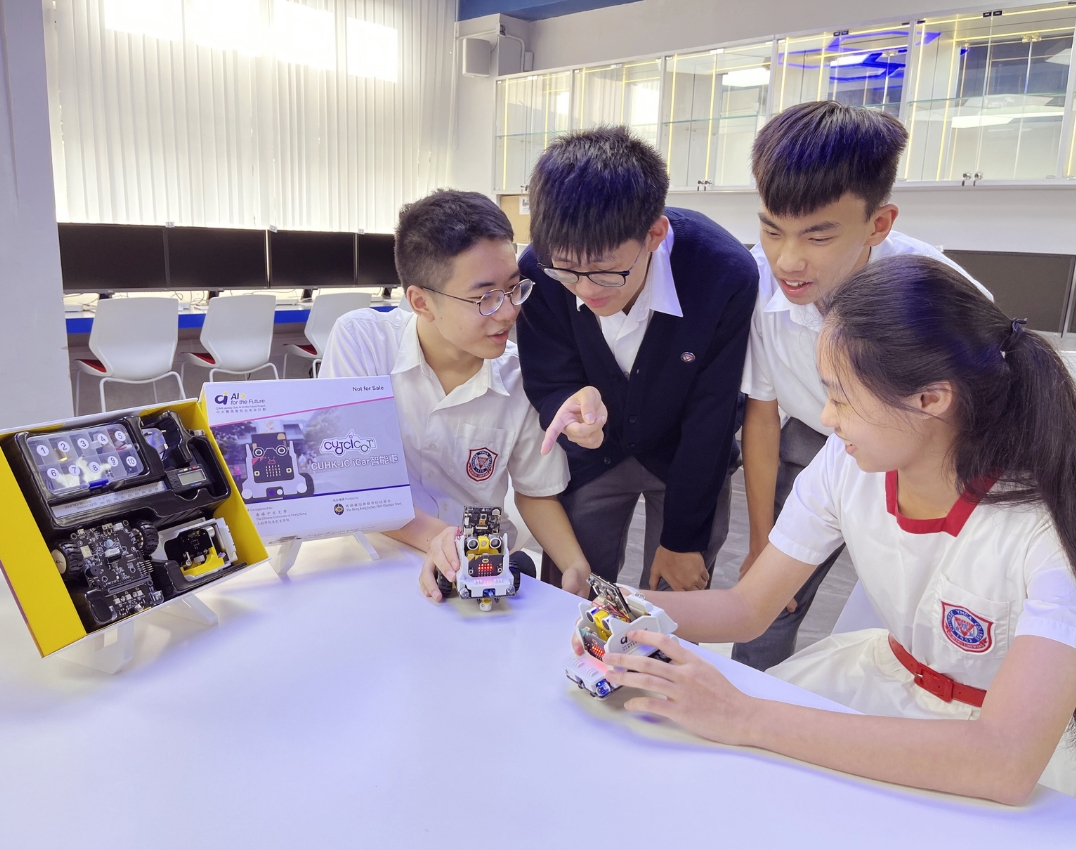Artificial Intelligence Education Equips Students to Embrace Future Opportunities
With the rapid development of technologies such as artificial intelligence (AI), innovative technology has become the trend of social development. To support the next generation in facing future challenges, innovation and technology play an increasingly important role in education. In order to promote the popularisation of innovative technology education, the Education Bureau of the HKSAR recently announced the launch of the ‘Module on Artificial Intelligence for Junior Secondary Level’. The content of the module is based on the teaching materials of the CUHK Jockey Club AI for the Future Project (‘Project’) and aims to assist teachers in integrating innovative technology elements into school curricula. As one of the participating schools in the Project, the Chinese YMCA College has been committed to introducing AI education into its curriculum and using teaching resources of the Project to help students grasp AI concepts and equip them to embrace the opportunities and challenges in the new era.
From Teaching Materials to Training, Comprehensive Support for AI Curriculum in Schools
The CUHK Jockey Club AI for the Future Project aims to create a new AI curriculum, a sustainable and comprehensive AI education model, and support frameworks for secondary schools in Hong Kong to promote the development of AI education ecology. The Project provides a complete set of AI curriculum for participating schools, as well as an online learning platform and teaching tools, including interactive experiments and blended learning resources to support classroom teaching.

Mr Leung Chun Kit Sam, Head of Technology Department of the Chinese YMCA College, said, ‘With the help of the Project, teachers can quickly grasp the teaching content which saves preparation time, so they can focus on promoting student learning and interactions to improve the effectiveness of learning and teaching.’ At a Project sharing event earlier, Ms Pang Yuk Yee, Assistant Education Officer of the Chinese YMCA College Technology Department, shared how they used the AI curriculum for teaching. ‘The teaching materials provide us with many news and daily life examples as a starting point, allowing students to understand the close connection between AI and life and arousing students’ interest. We then explain the underlying theory to make an impression to the students.
She gave an example that when teaching students about Automatic Speech Recognition (ASR), they searched for some interesting speech recordings for students to listen to, where the gender, dialect, and tone of the speakers were all different. Then the teacher would let the students think about the role and function of AI in speech recognition and explain the relevant theory to the students at the end.
Artificial Intelligence Curriculum for Junior Secondary Students in Hong Kong – Teaching and Learning Pack” is designed specifically for junior secondary school students. The content revolves around the five elements of the teaching framework, including ‘Awareness’, ‘Knowledge’, ‘Interaction’, ‘Empowerment’, and ‘Ethics and Impacts’, covering theoretical, practical, and ethical aspects. It includes the following 12 chapters:
• Introduction to AI
• Fundamentals of AI
• See
• Hear
• Speak
• Read
• AI Reasoning
• Simulation
• Think and Create
• Social Good, Social Impacts and Challenges of AI
• AI and Ethics
• AI and Future of Work
In addition to teaching materials, the Project also promotes teachers' professional development through Teacher AI Knowledge Enrichment Scheme, Teaching Competence Evaluation and Certificate System, and mentoring scheme. Ms Pang believes that the teacher activities as such have effectively helped her master AI learning and teaching. ‘The pioneering and champion schools hosted demonstration classes, which enabled me to experience AI classes from the perspective of students and understand how to effectively teach AI knowledge.’ She added that the Project also held many sharing activities where teachers can exchange experience and even share teaching materials, which established an AI education ecosystem for the education sector.
AI Education Must Take Ethics and Morality Seriously
In recent years, ethical and moral issues related to the use of AI have aroused widespread discussion. Mr Leung believes that AI is a tool, and there is no right or wrong in the application itself. The important thing is how we apply AI, such as whether we collect and use data responsibly, including respecting and protecting privacy; when the application of AI does not produce the expected results, how should we respond?
In response to concerns about ethics and morality, the content of the curriculum also focuses on the ethical aspects of AI, hoping to instil five AI ethical principles, including transparency, justice and fairness, beneficence, responsibility, and privacy, in students. The curriculum also encourages teachers to engage students in active thinking and response through classroom discussions and group activities. Mr Leung often discusses AI-related ethical and moral issues with students in class. Once he used the content of the curriculum to guide students think: If an autonomous vehicle causes an accident due to AI errors, who should be responsible? Mr Leung was pleased to see the enthusiastic discussion where students had different opinions and demonstrated critical thinking. He believes that this kind of reflection and interaction is very important, which can guide students to think from multiple perspectives and explore the correct way to use AI technology.
AI Education Helps Students’ Future Development
Mr Leung said that with the rapid development of society, AI applications are already very extensive, and there will be more jobs related to AI in the future. If schools can lay a foundation for students, when they enter society in the future, they will be able to cope with various opportunities and challenges smoothly. Ms Pang said that the AI curriculum in the school have now extended to senior forms, providing students with advanced AI knowledge and skills training, and equipping students who are interested in entering AI-related industries with opportunities for further studies and employment.

